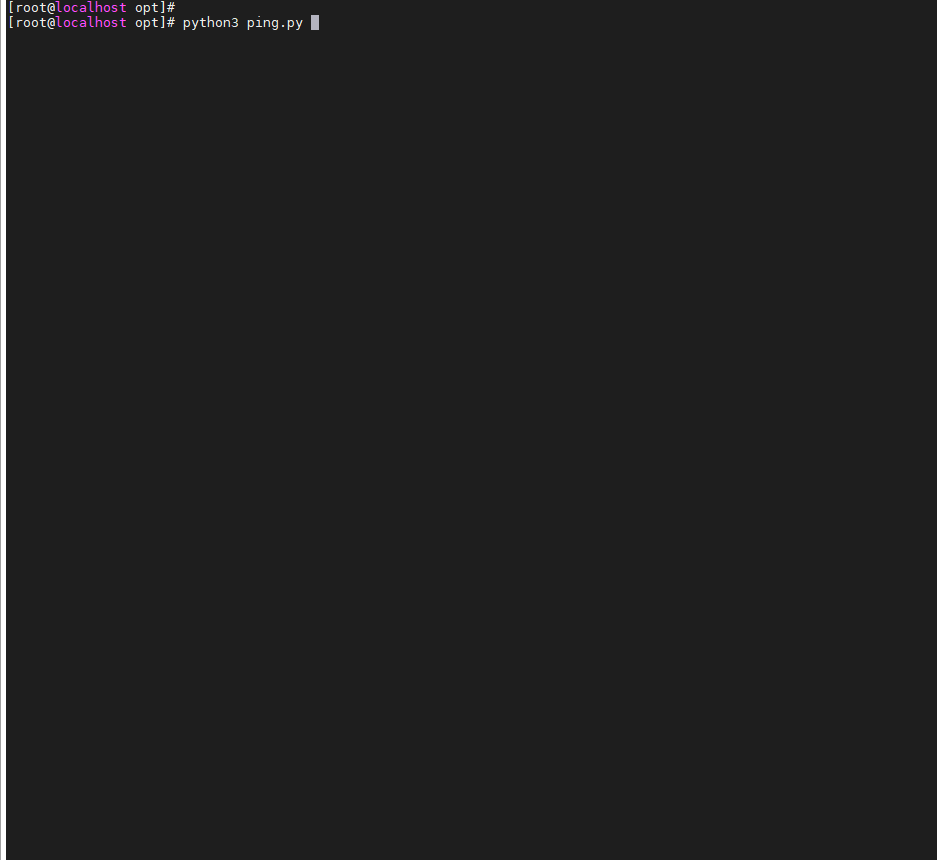

如何利用Python实现快速Ping一个IP网段地址?
描述
ping 命令是我们检查网络中最常用的命令,作为网络人员,基本上每天都会用到,可以很好地帮助我们分析和判定网络故障;如果有 10 设备,100 台设备,1000 台设备怎么办?一个个 ping 过去人都要疯掉了,这种情况在大型网络中我们有可能遇到,那怎么办呢?我们今天来看下如何用 python 来实现批量 ping 测试主机。代码如下:
#!/usr/bin/python3# -*- coding: utf-8 -*-import os
import argparse
import socket
import struct
import select
import time
ICMP_ECHO_REQUEST = 8 # Platform specific
DEFAULT_TIMEOUT = 0.1
DEFAULT_COUNT = 4class Pinger(object):
“”“ Pings to a host -- the Pythonic way”“”
def __init__(self, target_host, count=DEFAULT_COUNT, timeout=DEFAULT_TIMEOUT):
self.target_host = target_host
self.count = count
self.timeout = timeout
def do_checksum(self, source_string):
“”“ Verify the packet integritity ”“”
sum = 0
max_count = (len(source_string)/2)*2
count = 0
while count 《 max_count:
val = source_string[count + 1]*256 + source_string[count]
sum = sum + val
sum = sum & 0xffffffff
count = count + 2
if max_count《len(source_string):
sum = sum + ord(source_string[len(source_string) - 1])
sum = sum & 0xffffffff
sum = (sum 》》 16) + (sum & 0xffff)
sum = sum + (sum 》》 16)
answer = ~sum
answer = answer & 0xffff
answer = answer 》》 8 | (answer 《《 8 & 0xff00)
return answer
def receive_pong(self, sock, ID, timeout):
“”“
Receive ping from the socket.
”“”
time_remaining = timeout
while True:
start_time = time.time()
readable = select.select([sock], [], [], time_remaining)
time_spent = (time.time() - start_time)
if readable[0] == []: # Timeout
return
time_received = time.time()
recv_packet, addr = sock.recvfrom(1024)
icmp_header = recv_packet[20:28]
type, code, checksum, packet_ID, sequence = struct.unpack(
“bbHHh”, icmp_header
)
if packet_ID == ID:
bytes_In_double = struct.calcsize(“d”)
time_sent = struct.unpack(“d”, recv_packet[28:28 + bytes_In_double])[0]
return time_received - time_sent
time_remaining = time_remaining - time_spent
if time_remaining 《= 0:
return
def send_ping(self, sock, ID):
“”“
Send ping to the target host
”“”
target_addr = socket.gethostbyname(self.target_host)
my_checksum = 0
# Create a dummy heder with a 0 checksum.
header = struct.pack(“bbHHh”, ICMP_ECHO_REQUEST, 0, my_checksum, ID, 1)
bytes_In_double = struct.calcsize(“d”)
data = (192 - bytes_In_double) * “Q”
data = struct.pack(“d”, time.time()) + bytes(data.encode(‘utf-8’))
# Get the checksum on the data and the dummy header.
my_checksum = self.do_checksum(header + data)
header = struct.pack(
“bbHHh”, ICMP_ECHO_REQUEST, 0, socket.htons(my_checksum), ID, 1
)
packet = header + data
sock.sendto(packet, (target_addr, 1))
def ping_once(self):
“”“
Returns the delay (in seconds) or none on timeout.
”“”
icmp = socket.getprotobyname(“icmp”)
try:
sock = socket.socket(socket.AF_INET, socket.SOCK_RAW, icmp)
except socket.error as e:
if e.errno == 1:
# Not superuser, so operation not permitted
e.msg += “ICMP messages can only be sent from root user processes”
raise socket.error(e.msg)
except Exception as e:
print(“Exception: %s” %(e))
my_ID = os.getpid() & 0xFFFF
self.send_ping(sock, my_ID)
delay = self.receive_pong(sock, my_ID, self.timeout)
sock.close()
return delay
def ping(self):
“”“
Run the ping process
”“”
for i in range(self.count):
print (“Ping to %s.。。” % self.target_host,)
try:
delay = self.ping_once()
except socket.gaierror as e:
print (“Ping failed. (socket error: ‘%s’)” % e[1])
break
if delay == None:
print (“Ping failed. (timeout within %ssec.)” % self.timeout)
else:
delay = delay * 1000
print(“Get pong in %0.4fms” % delay)
if __name__ == ‘__main__’:
alive = []
host_prefix = ‘192.168.242.’
for i in range(1, 255):
host = host_prefix + str(i)
pinger = Pinger(target_host=host)
delay = pinger.ping_once()
if delay == None:
print(“Ping %s 失败,超时2秒” % host)
else:
print(“ping %s = %s ms” % (host, round(delay * 1000, 4)))
alive.append(host)
# time.sleep(0.5)
测试如下:

原文链接:www.yjsec.com/2020/11/07
编辑:jq
-
如何利用python和API查询IP地址?2024-08-28 13902
-
多个IP地址批量ping的方法2020-12-01 2011
-
如何去解决lwip跨网段ping不通的问题呢2022-09-29 1802
-
怎样去解决lwip跨网段ping不通的问题呢?2023-02-03 1687
-
解决:本机ping不到PLC的IP地址2023-04-17 2618
-
两个网络IP地址是否在同一个段中的判断方法2023-06-02 15217
-
NAT转换网关实现跨网段访问和网段隔离2023-07-31 1402
-
如何判断两个IP地址在同一个网段?如何实现跨网段访问?2023-08-18 2952
-
网段隔离器(NAT网关)如何解决IP地址冲突问题?2023-08-28 1340
-
多个相同IP设备通过网段隔离器实现不同IP的访问映射2023-11-15 1881
-
什么是子网掩码?如何根据掩码来确定ip地址网段?2023-12-07 4063
-
ping不存在的地址会咋样?ping和谁都不在一个网段的IP又会如何?2024-02-04 2992
-
NAT网关如何修改PLC的IP地址实现跨网段访问2024-07-18 1192
-
跨网段IP耦合器实现工业设备快速接入物联网平台2024-09-27 1017
-
无需修改设备IP实现跨网段访问的解决方案2024-12-09 1144
全部0条评论

快来发表一下你的评论吧 !

